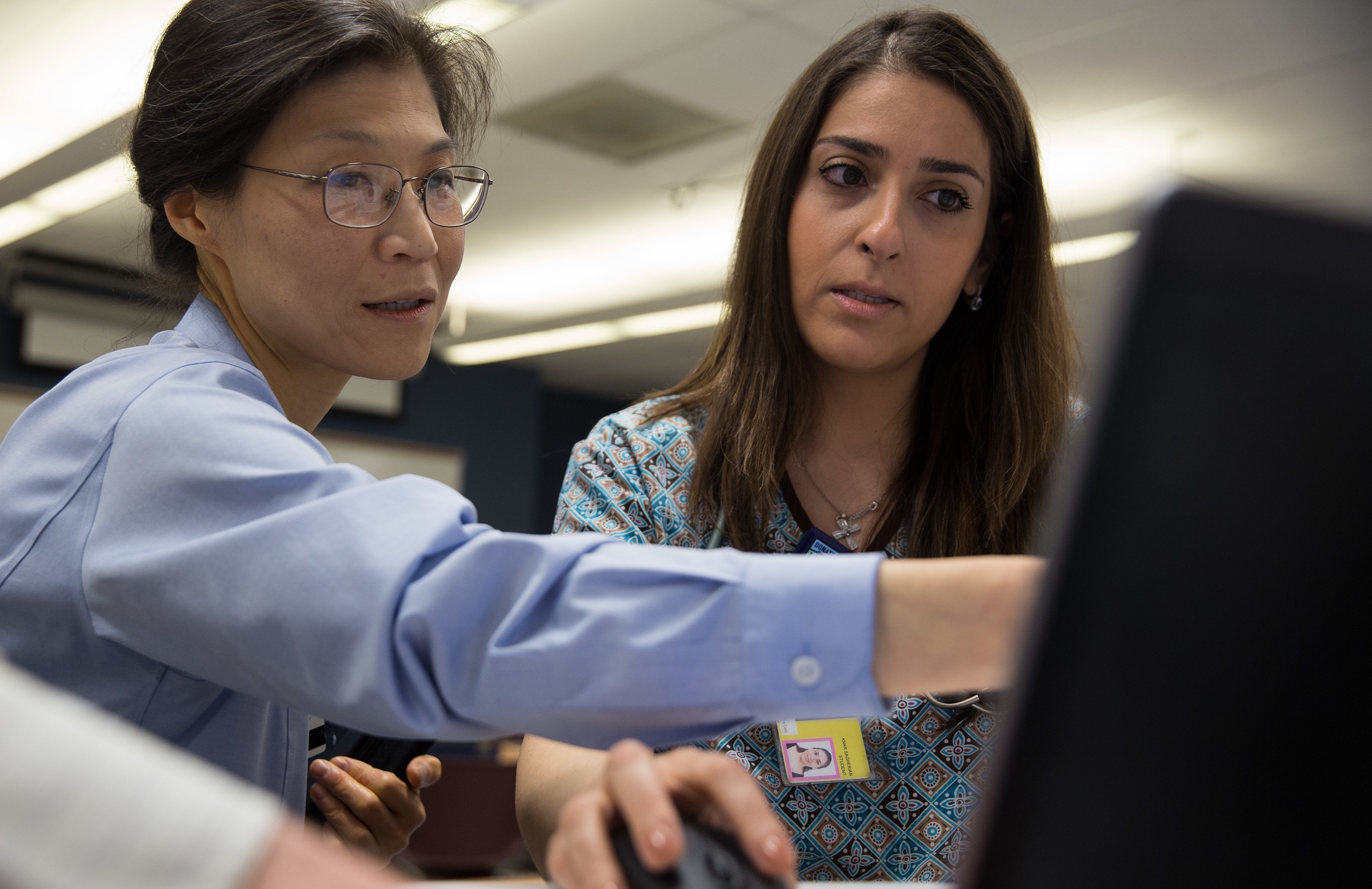Researcher Profile: Eun-Shim Nahm
February 12, 2020 Giordana Segneri
As the number of cancer survivors grows, digital technologies are needed to support them.
Researcher:
Eun-Shim Nahm, PhD '03, RN, FAAN, professor and director, Nursing Informatics master’s specialty
Areas of Expertise:
Using eHealth and patient portal technologies to manage chronic conditions, improve patient outcomes, and improve workflow of clinicians. Nahm focuses especially on applying technologies to promote health for older adults and on developing, implementing, and optimizing health information systems.
The BIG idea:
Nahm has received UMSON and the University of Maryland Medical Center’s (UMMC) joint $15,000 UMNursing one-year grant for the project “The Impact of a Digital Cancer Survivorship Patient Engagement Toolkit (CaS-PET Silver) on Older Cancer Survivors’ Health Outcomes: A Pilot Study.” She has partnered with Mary McQuaige, BSN, RN, OCN, of the UMMC Marlene and Stewart Greenebaum Comprehensive Cancer Center.
Why does the research matter?
As of Jan. 1, 2019, there were more than 16.9 million cancer survivors living in the United States, and the number is expected to reach more than 22.1 million by 2030, according to the American Cancer Society. This is a testament to advanced research and health technologies that are allowing survivors to live longer. “Cancer has become a chronic condition,” says Nahm, who began her nursing career 30 years ago in oncology and then moved to gerontology and health care informatics. “When cancer patients finish treatment, they have to go back to normal life. But it’s not really normal life. They have to adapt to a ‘new normal’ while managing symptoms from their treatment.”
They also have to balance work and family obligations with their psychosocial and spiritual needs while constantly surveilling their health, as this population is at high risk for developing other chronic conditions or secondary cancers. “Cancer survivors tend to have lower activity levels, which lead to cardiac problems,” Nahm explains. “Especially for older adults, many chronic conditions can be co-occurring with cancer, and they can affect each other. That’s why self-management and empowerment are so important in cancer survivors.”
Who does the research matter to?
Nahm’s focus is on providing older cancer survivors with the support they need through digital technologies, providing them with resources and support in community settings, and connecting them to their peers in an online environment where they are already spending time. But it’s not enough to simply create the technology; “If you’re not motivated, you’re not going to use it,” she says. “So my role as a researcher is to find a way to motivate you to use it to benefit you.”
What are the clinical applications of the research?
Nahm aims to capitalize on existing technologies to provide support to older cancer survivors (the average age of cancer occurrence is 66, Nahm says) once they leave acute settings. “One-time static modules or paper don’t cut it,” she says. “Technologies allow us to create bidirectional communication to increase patient-provider communication. We can really engage them in their care, and then we can empower them to better manage their health in the community where they reside. That’s what our intervention is about.”
Nahm and her research partners have developed online resource modules, informed by clinicians, on topics relevant to cancer survivors, such as diet and managing difficult emotions. Appropriate amounts of information are delivered in a user-friendly format at the right time. “Upon completion of the cancer treatment, we send e-messages every other week through the patient portal to ask how they’re doing, and in the messages we embed links to support modules and video lectures,” Nahm explains. “The online support program starts with survivorship. There’s one module about fear of recurrence — it lets them know it’s OK to feel that way and offers strategies to overcome the fear.” Outreach is important in heading off other effects such as the guilt that can arise from surviving when others die. “Through our research, when we reached out to survivors proactively, we were able to detect those symptoms early,” Nahm says.
The e-messages also include links to a discussion board that nurses moderate; if it’s clear from the discussion that patients need a clinical consultation, the nurses connect them with oncology nurse navigators, specialists, or other providers.
Cancer survivorship is a population health issue, Nahm says. “Survivors’ numbers will increase because of the advanced treatment, but it doesn’t mean that their quality of life is guaranteed,” she adds. “It’s important that we provide continuous support to enhance quality of life for the rest of their lives.”
Above, left: Nahm works with a UMSON student